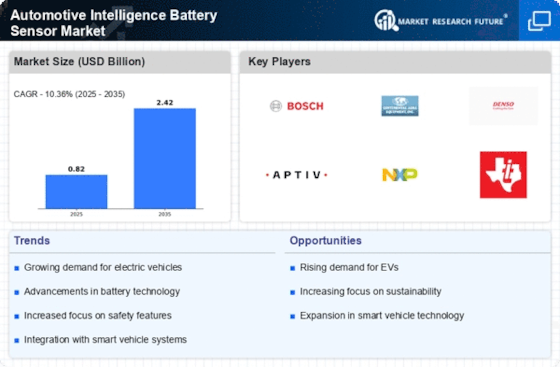Market Analysis
In-depth Analysis of Automotive Intelligence Battery Sensor Market Industry Landscape
A number of factors influence profoundly the Automotive Intelligence Battery Sensor (AIBS) market due to which it exhibits diverse dynamics. The growth of AIBS is one instance resulting from ADAS incorporation in EVs within the car industry according to pollster’s estimates. Accordingly such systems rely heavily on precise battery information as part of their intricate structures hence compelling them to employ smart battery sensors.
Additionally, there is also an increasing global trend towards environmental sustainability and strict emission regulations, which has accelerated the adoption of electric and hybrid vehicles. The AIBS market is witnessing a substantial growth as automakers are seeking greener mobility solutions while trying to optimize battery performance, manage energy well, and improve overall vehicle efficiency.
Another key market factor is the growing complexity of automotive electrical systems. Modern cars have numerous electronic components such as advanced infotainment systems, connectivity features, and power hungry sensors. In these electronic systems’ energy usage monitoring and management, AIBS plays a crucial role that ensures optimal performance while avoiding battery drain problems. This along with increases in demands for in-vehicle connectivity and enhanced features create need for intelligent battery sensors to maintain system reliability in vehicles.
Another aspect shaping the AIBS segment is the evolving landscape of the automotive aftermarket. As the automotive industry shifts towards electric and hybrid vehicles, the aftermarket for battery-related components including intelligent battery sensors also expands. Independent repair shops and service providers are increasingly focusing on acquiring the expertise and tools necessary to cater to electric vehicle maintenance and repair, driving demand for AIBS in the aftermarket segment.
However, high initial costs associated with AIBS deployment data security concerns and standardized communication protocols remain obstacles despite positive market factors like technological advancement among others. To overcome these challenges industry players will have to come together to eliminate technical hindrances; establish norms applicable throughout their business operations that will make consumers believe them on reliability as well as security issues concerning smart batteries.

















Leave a Comment